 You might remember Christoph from such hackaday articles as https://hackaday.com/2017/06/30/3d-printed-halbach-motor-part-deux-tuning-testing/ and https://hackaday.com/2014/05/24/the-hour-of-the-3d-printed-clock-draws-nigh/
You might remember Christoph from such hackaday articles as https://hackaday.com/2017/06/30/3d-printed-halbach-motor-part-deux-tuning-testing/ and https://hackaday.com/2014/05/24/the-hour-of-the-3d-printed-clock-draws-nigh/
 You wrote that first one, Dan.
You wrote that first one, Dan.
 Right, Christophe - knew it looked familiar. Honestly looks like it could snap that PCB in half with a few twists of the wrist
Right, Christophe - knew it looked familiar. Honestly looks like it could snap that PCB in half with a few twists of the wrist
 ahaha. Will not seek to confirm.
ahaha. Will not seek to confirm.
 p.s., here's the thingiverse link, though have patience as the site still sucks: https://www.thingiverse.com/thing:2064269
p.s., here's the thingiverse link, though have patience as the site still sucks: https://www.thingiverse.com/thing:2064269
 While I'm here with the world's best hackers, maybe another question: Is it possible to correctly assess these capacitors without desoldering them the board?
While I'm here with the world's best hackers, maybe another question: Is it possible to correctly assess these capacitors without desoldering them the board?
 Hi Tarek, great innovations. I read your papers and it's an amazing work
Hi Tarek, great innovations. I read your papers and it's an amazing work
 Thank you so much, Chinna!
Thank you so much, Chinna!
 I suspect you might be working on a electronic stethoscope as well?
I suspect you might be working on a electronic stethoscope as well?
 Not really. We thought about the idea and let it go for three main reasons: The first is that the electronic stethoscope is a significant step backward with current technology in terms of usability and quality. Any health care provider who's used both can testify to that. They are primarily an advantage for people with hearing issues, and for teaching. The second is that they are largely covered by patents still. And lastly, our project is trying to approach the basics of each piece of equipment. After we get them out there, maybe we'll circle back to upgrade things.
Not really. We thought about the idea and let it go for three main reasons: The first is that the electronic stethoscope is a significant step backward with current technology in terms of usability and quality. Any health care provider who's used both can testify to that. They are primarily an advantage for people with hearing issues, and for teaching. The second is that they are largely covered by patents still. And lastly, our project is trying to approach the basics of each piece of equipment. After we get them out there, maybe we'll circle back to upgrade things.
 Thanks for the reply. It's good to know these reasons from an expert.
Thanks for the reply. It's good to know these reasons from an expert.
 I mean from you
I mean from you
 Thank you for the vote of confidence. Our team is trying to make the best decisions based on the situation as we perceive it, so the decisions are always more discussions and priority-setting than final say
Thank you for the vote of confidence. Our team is trying to make the best decisions based on the situation as we perceive it, so the decisions are always more discussions and priority-setting than final say
 I am working on ophthalascope attachment for a smartphone
I am working on ophthalascope attachment for a smartphone
 I'm working on a printer for synthetic skin, but I got nothing to show for it yet, am here to learn :)
I'm working on a printer for synthetic skin, but I got nothing to show for it yet, am here to learn :)
 I found that the lenses are pretty costly
I found that the lenses are pretty costly
 @Chinna and @Matteo: That's great. Please let me know how things progress and hwo we can help
@Chinna and @Matteo: That's great. Please let me know how things progress and hwo we can help
 @Chinna: The lenses are indeed expensive. It's one of the reasons we started with an otoscope (look in ears). https://github.com/GliaX/Otoscope
@Chinna: The lenses are indeed expensive. It's one of the reasons we started with an otoscope (look in ears). https://github.com/GliaX/Otoscope
 I've been occasionally kicking in my mind how we could accomplish an ophthalmoscope in a way that's reliable and sustainable. Haven't quite figured it out yet...
I've been occasionally kicking in my mind how we could accomplish an ophthalmoscope in a way that's reliable and sustainable. Haven't quite figured it out yet...
 Yep, I saw your otoscope. It's great. I made one of my own as well, but it's with rechargeable batteries.
Yep, I saw your otoscope. It's great. I made one of my own as well, but it's with rechargeable batteries.
 What do you mean by rechargeable batteries? I use mine with some rechargeable AA batteries. Would that count?
What do you mean by rechargeable batteries? I use mine with some rechargeable AA batteries. Would that count?
 Also, would be amazing to see your design.
Also, would be amazing to see your design.

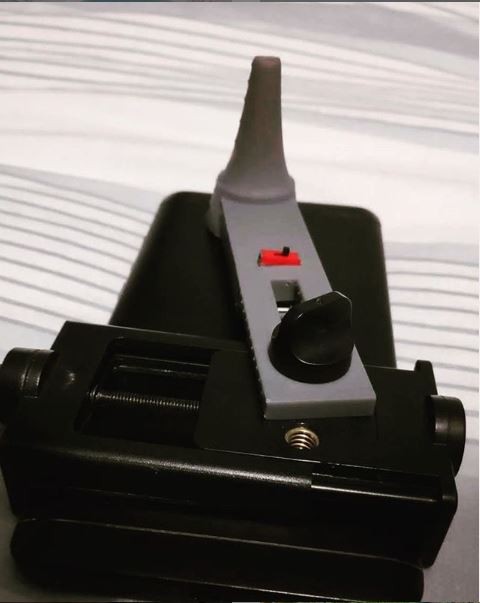
 Oh!! phone-based!
Oh!! phone-based!
 Cool idea with re-using a stock holder.
Cool idea with re-using a stock holder.
 Yep, but can be used without the phone as well
Yep, but can be used without the phone as well
 Yep
Yep
 cool!
cool!
 An amazing hacker named Kliment Yanev made a phone-mounted for us that we could never really get to work. I ended up deprecating it in our otoscope repo: https://github.com/GliaX/Otoscope/tree/phone_mounted
An amazing hacker named Kliment Yanev made a phone-mounted for us that we could never really get to work. I ended up deprecating it in our otoscope repo: https://github.com/GliaX/Otoscope/tree/phone_mounted
 @Chinna : Is it FLOSS?
@Chinna : Is it FLOSS?
 It would be great to link to it at least from our rep
It would be great to link to it at least from our rep
 repo
repo
 I yet to document my design
I yet to document my design

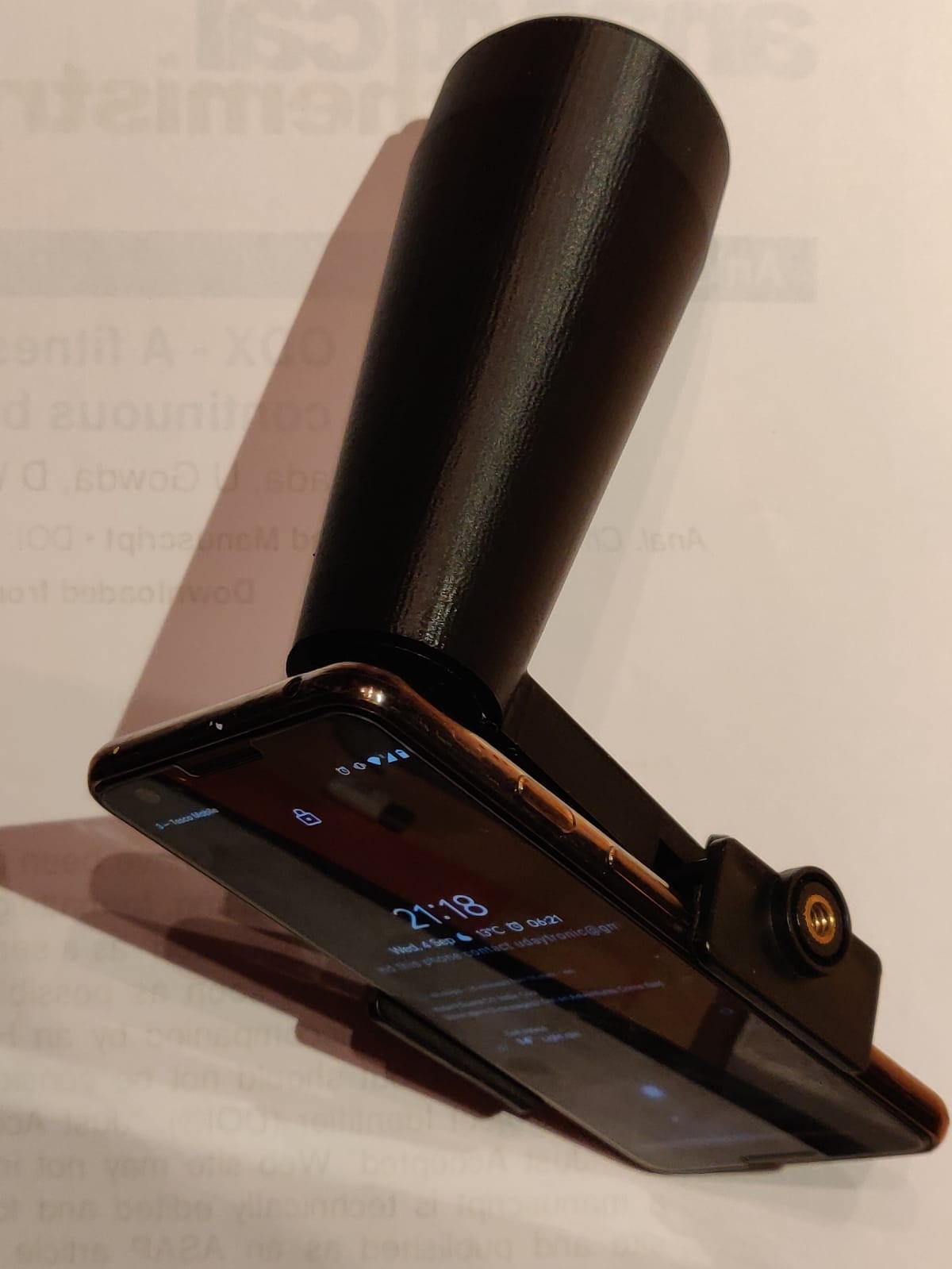
 This is the opthalscope
This is the opthalscope
 But the lens I ordered was a fake one, so didn't work as expected
But the lens I ordered was a fake one, so didn't work as expected
 That's a real shame, @Chinna. We've found that documentation is the most important part. It allows us to both succeed and fail gracefully. Because other people have documented their work, we were able to move some projects forward much faster than we thought we would be able to (e.g., our ECG). And lots of people have built on our incomplete projects too
That's a real shame, @Chinna. We've found that documentation is the most important part. It allows us to both succeed and fail gracefully. Because other people have documented their work, we were able to move some projects forward much faster than we thought we would be able to (e.g., our ECG). And lots of people have built on our incomplete projects too
 I will make these designs open source in the next two months or so
I will make these designs open source in the next two months or so
 Yep, saw your repo and I will make a similar one for my work as well
Yep, saw your repo and I will make a similar one for my work as well
 Excellent. Please share it when you do!
Excellent. Please share it when you do!
 You are very inspiring and I hope to contribute to your efforts when I can
You are very inspiring and I hope to contribute to your efforts when I can

https://hackaday.com/2019/09/20/fitness-tracker-hacked-into-optical-density-meter/
Fitness Tracker Hacked Into Optical Density Meter
What do fitness trackers have to do with bacterial cultures in the lab? Absolutely nothing, unless and until someone turns a fitness band into a general-purpose optical densitometer for the lab. This is one of those stories that shows that you never know from where inspiration is going to come.
 By the way, the above article is about my work and we open sourced that project completely
By the way, the above article is about my work and we open sourced that project completely
 Great project, and great article! Thank you for sharing.
Great project, and great article! Thank you for sharing.
 @Chinna great work, inspiring
@Chinna great work, inspiring
 I'll bookmark this for when Glia starts work on some of our diagnostics equipment.
I'll bookmark this for when Glia starts work on some of our diagnostics equipment.
 Thank you
Thank you
 Alright, finally ready for the hack chat!
Alright, finally ready for the hack chat!

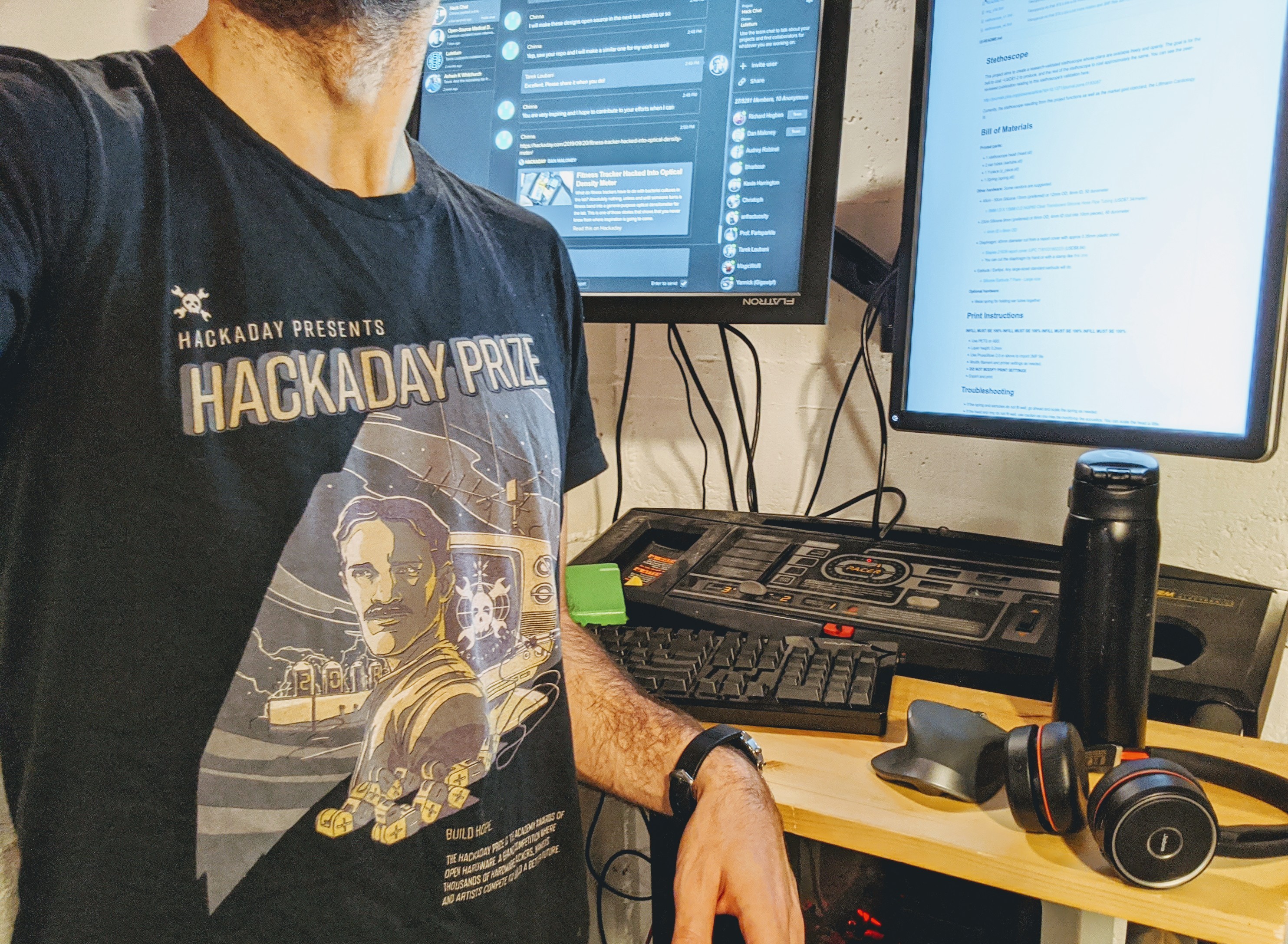
 Hi everyone, time to get started officially. I want to welcome Tarek Loubani to the Hack Chat today to discuss the open-source medical devices he's been developing.
Hi everyone, time to get started officially. I want to welcome Tarek Loubani to the Hack Chat today to discuss the open-source medical devices he's been developing.
 Thank you for having me, Dan! I'm a long time reader and fan, and happy to be here!
Thank you for having me, Dan! I'm a long time reader and fan, and happy to be here!
 Can you tell us a little about yourself and how you got into rolling your own medical instruments?
Can you tell us a little about yourself and how you got into rolling your own medical instruments?
 I'm an emergency physician who's been a tinkerer from a really young age, I suspect much like all of us here.
I'm an emergency physician who's been a tinkerer from a really young age, I suspect much like all of us here.
 I am also a refugee to Canada, having been born a Palestinian refugee in Kuwait, and then having escaped again after the first Gulf War in 1990
I am also a refugee to Canada, having been born a Palestinian refugee in Kuwait, and then having escaped again after the first Gulf War in 1990
 When I got into medicine, it was important to me to do work in the places that I escaped that so many of my friends never managed to. My classmates were all smarter and better than me at so many things when the war hit, but I was the one who had an uncle in Canada, so I was able to escape. They were never able to realize their potential, ending up mostly in refugee camps in jordan, syria, lebanon and elsewhere.
When I got into medicine, it was important to me to do work in the places that I escaped that so many of my friends never managed to. My classmates were all smarter and better than me at so many things when the war hit, but I was the one who had an uncle in Canada, so I was able to escape. They were never able to realize their potential, ending up mostly in refugee camps in jordan, syria, lebanon and elsewhere.
 Once I started going to conflicted regions like Israel/Palestine, Iraq, Lebanon, Venezuela, Colombia, I realized that my ideas about high technology and how it could help were stupid.
Once I started going to conflicted regions like Israel/Palestine, Iraq, Lebanon, Venezuela, Colombia, I realized that my ideas about high technology and how it could help were stupid.
 Instead of robots and some kind of high tech utopianism, what people wanted and were asking for - for that matter, what I needed as a physician - were the simple things.
Instead of robots and some kind of high tech utopianism, what people wanted and were asking for - for that matter, what I needed as a physician - were the simple things.
 I was trying to treat patients in Gaza during the 2012 war, and I just couldn't. We didn't have enough stethoscopes, never mind advanced machinery like ultrasound and CT that I depend on in my canadian practice.
I was trying to treat patients in Gaza during the 2012 war, and I just couldn't. We didn't have enough stethoscopes, never mind advanced machinery like ultrasound and CT that I depend on in my canadian practice.
 My nephew's toy stethoscope got me thinking after I listened to it and realized it wasn't total shit.
My nephew's toy stethoscope got me thinking after I listened to it and realized it wasn't total shit.
 That was the genesis of Glia.
That was the genesis of Glia.
 Funny - my kids had one of those too, and I found it fairly useful. I mean, there's not much to a stethoscope really.
Funny - my kids had one of those too, and I found it fairly useful. I mean, there's not much to a stethoscope really.
 I think my first printer was a prusa i1, so I was already thinking about the tech.. But it was really with the help of some of this community like Kliment Yanev and Jennifer Glauche that we got started trying to turn it into something that could help in a professional way.
I think my first printer was a prusa i1, so I was already thinking about the tech.. But it was really with the help of some of this community like Kliment Yanev and Jennifer Glauche that we got started trying to turn it into something that could help in a professional way.
 Yeah, the stethoscope is not a technology problem. It's an economics problem.
Yeah, the stethoscope is not a technology problem. It's an economics problem.
 There's no patents covering it. It's not a special tech. It's just that there is essentially a duopoly that means that if you want a good one, you have to pay $200-$300 USD for it.
There's no patents covering it. It's not a special tech. It's just that there is essentially a duopoly that means that if you want a good one, you have to pay $200-$300 USD for it.
 Regarding the stethoscope, i'm just wondering i saw there actually seem to be ones from China for around $3, with a metal parts, have you looked at those out of interest?
Regarding the stethoscope, i'm just wondering i saw there actually seem to be ones from China for around $3, with a metal parts, have you looked at those out of interest?
 So we knew it was attainable.
So we knew it was attainable.
 @anfractuosity : Yes, of course. We started this project with smuggling stethoscopes we bought outside.
@anfractuosity : Yes, of course. We started this project with smuggling stethoscopes we bought outside.
 But those stethoscopes aren't validated and when we tested them, they were terrible.
But those stethoscopes aren't validated and when we tested them, they were terrible.
 for example, pvc tubing, poor acoustics, terrible diaphragms.
for example, pvc tubing, poor acoustics, terrible diaphragms.
 gotcha thanks!
gotcha thanks!
 It turned out that Yes, Virginia, you CAN fuck up a stethoscope.
It turned out that Yes, Virginia, you CAN fuck up a stethoscope.
 How would you need to validate stethoscopes?
How would you need to validate stethoscopes?
 lol
lol
![]() That doesn't really surprise me. The QC on low grade analog instruments is usually pretty poor.
That doesn't really surprise me. The QC on low grade analog instruments is usually pretty poor.
 Those stethoscopes are actually available in Gaza for the cost of around $5 USD. But nobody uses them because they are.. unusable.
Those stethoscopes are actually available in Gaza for the cost of around $5 USD. But nobody uses them because they are.. unusable.
 ahh
ahh
 When we give a Glia stethoscope to people there, it's like you gave them sight for the first time. it was such a problem that we actually had to start training people in auscultation (listening with a stethoscope) because the art was lost in Gaza.
When we give a Glia stethoscope to people there, it's like you gave them sight for the first time. it was such a problem that we actually had to start training people in auscultation (listening with a stethoscope) because the art was lost in Gaza.
![]() to be candid, I thought the greatest use of the 3d printed one would be for add-ons...ie-help training of interns or pre-clinical provider QA with a recordable box in the auditory transmission line, for playback during a clinical-debrief
to be candid, I thought the greatest use of the 3d printed one would be for add-ons...ie-help training of interns or pre-clinical provider QA with a recordable box in the auditory transmission line, for playback during a clinical-debrief
 @riley.august : Exactly. Glia's "product" is not the stethoscope. It's the recipe (source / files / bom) and the QA process (how you know you got it right)
@riley.august : Exactly. Glia's "product" is not the stethoscope. It's the recipe (source / files / bom) and the QA process (how you know you got it right)
 What's the key to a quality stethoscope? Diapraghm? Bell shape? Something else?
What's the key to a quality stethoscope? Diapraghm? Bell shape? Something else?
 @Tammo Heeren : We did acoustic testing to prove the equivalence. http://journals.plos.org/plosone/article?id=10.1371/journal.pone.0193087
@Tammo Heeren : We did acoustic testing to prove the equivalence. http://journals.plos.org/plosone/article?id=10.1371/journal.pone.0193087
![]() I'm left with a simpler question. Why hasn't anyone developed a digital stethoscope yet? Audio fidelity's been there for fifty years.
I'm left with a simpler question. Why hasn't anyone developed a digital stethoscope yet? Audio fidelity's been there for fifty years.
![]() thanks for the reference...will read
thanks for the reference...will read
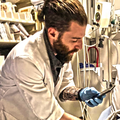 @riley.august There are plenty of examples of electronic stethoscopes out there, but they tend to be pretty expensive
@riley.august There are plenty of examples of electronic stethoscopes out there, but they tend to be pretty expensive
 I'm just wondering, do you ever need to sterilise a stethoscope?
I'm just wondering, do you ever need to sterilise a stethoscope?
 @Tarek Loubani Right. Equivalency might not be required. Something is better than nothing.
@Tarek Loubani Right. Equivalency might not be required. Something is better than nothing.
![]() have you ever considered publishing a followup in JET-EM for broader clinical adoption?
have you ever considered publishing a followup in JET-EM for broader clinical adoption?
 @Dr. Clint LeClair: That's one of the important contexts for the stethoscope, and perhaps the greatest use in a rich context. The greatest use in a place like Gaza or any place that is resource poor is giving it to physicians, nurses and paramedics and having them auscultate with it
@Dr. Clint LeClair: That's one of the important contexts for the stethoscope, and perhaps the greatest use in a rich context. The greatest use in a place like Gaza or any place that is resource poor is giving it to physicians, nurses and paramedics and having them auscultate with it
 For example, https://shop.ekohealth.com/products/core-digital-stethoscope?utm_source=Google&utm_medium=cpc&utm_campaign=Shopping&gclid=CjwKCAiA98TxBRBtEiwAVRLquzuEPWTqmW2PQ04wotnpC6RLnY_0KTCqVfFRmAMMMEWsFb7MWK75CRoC1bUQAvD_BwE
For example, https://shop.ekohealth.com/products/core-digital-stethoscope?utm_source=Google&utm_medium=cpc&utm_campaign=Shopping&gclid=CjwKCAiA98TxBRBtEiwAVRLquzuEPWTqmW2PQ04wotnpC6RLnY_0KTCqVfFRmAMMMEWsFb7MWK75CRoC1bUQAvD_BwE
 $250
$250
 So, where do you need help?
So, where do you need help?
 @Dan Maloney : The tube size, it turns out... though the other things do matter. But we found that what cripples it the most is the tube.
@Dan Maloney : The tube size, it turns out... though the other things do matter. But we found that what cripples it the most is the tube.

 @Elias Jaffa is a fellow emergency physician and big part of the Glia team!
@Elias Jaffa is a fellow emergency physician and big part of the Glia team!
 Hey everyone!
Hey everyone!
 Yes, I'm Eli Jaffa, an EM doc in South Carolina, USA and a fellow tech / open-source enthusiast
Yes, I'm Eli Jaffa, an EM doc in South Carolina, USA and a fellow tech / open-source enthusiast
 Hi Elias! Welcome!
Hi Elias! Welcome!
 @riley.august : Electronic stethoscopes just aren't the priority right now.. That's all.
@riley.august : Electronic stethoscopes just aren't the priority right now.. That's all.
 Though less of a straight-up expert like the good Dr. Loubani
Though less of a straight-up expert like the good Dr. Loubani
 Lutetium
Lutetium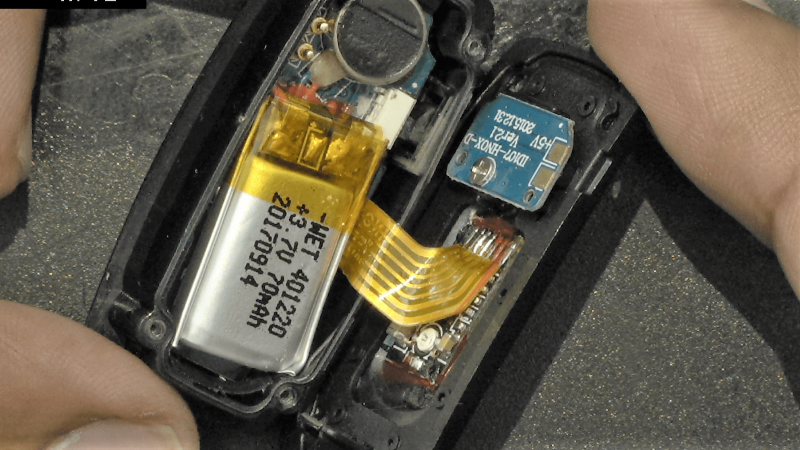
Discussions
Become a Hackaday.io Member
Create an account to leave a comment. Already have an account? Log In.